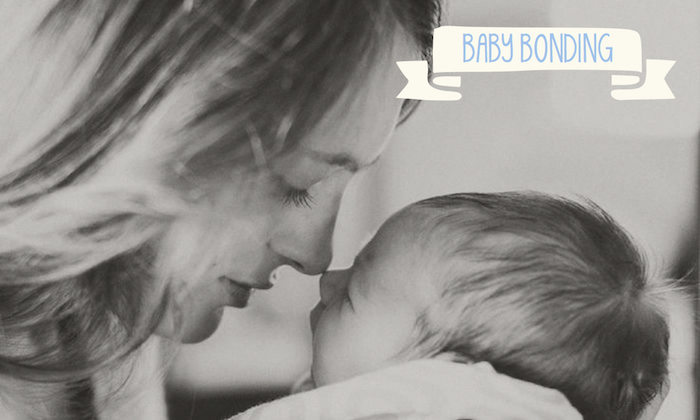
 Post Category - ExpertsExperts - Post Category - BabyBaby
Post Category - ExpertsExperts - Post Category - BabyBaby Post Category - PostnatalPostnatal - Post Category - ParentingParenting
Post Category - PostnatalPostnatal - Post Category - ParentingParentingHow can you bond with your baby after its arrival?
Rushing the process of getting pregnant, giving birth or early breastfeeding helps no one. In fact, it sometimes gets in the way of things happening or at least makes them less enjoyable. Certainly one of the above is better when done slowly.
This also extends to the days after the baby is born – what we choose to call the ‘fourth trimester’. Research shows us that the development of the baby, bonding between parents and the baby, the success of breastfeeding and good sleep patterns has much to do with how patient and perceptive one is to all the things that are happening in a new baby’s life.
Life outside the womb
First, we need to understand how difficult it is for our newborns to adapt to life outside the womb, a place they have rested in for nine months, a place which offers peace and slow-motion rocking, soothing voices and tones that our little babies will soon learn to recognise. Now, they are opening their eyes, ears, skin, nose and all sensory systems to new and quite strong stimulation. Babies also have to adapt to a new, albeit instinctive way of feeding and sleeping, and sometimes are asked to fit that pattern around others, rather than relying on what their own little bodies are trying to communicate.
We do know, through research, that newborns respond and recognise their parents’ voices and tones, and certain things are familiar to them already. However, imagine all the stimulation that suddenly pours into the life of the newborns, immediately in the hospital in the first hour of life: strong lights shining straight onto their faces, many new individuals that all have loud voices and new smells, the smell of the room and cleaning products that are used at the time of the birth, the suctioning of the fluid that fills their lungs at the time of birth, a tube that goes all the way down the throat, the soap from bathing… the list goes on and on.
These are all quite new, and oftentimes jarring, experiences for a newborn, and we as new parents don’t realise enough how difficult it is for our little bubs who are just being introduced to the world.
Enjoy these very few weeks you have with your newborn
In the fourth trimester – the first weeks after the baby is born and is at home with you – there are many things you can do to make the transition easier and less stressful for both you and the baby and the family as a whole. Always keep in mind that the baby is adjusting and learning and finding its own feet and for the time being, the parents are its link to being able to do so. The baby relies on you 100 percent and tries to message you in the best way it possibly can. If you ignore or rush too much through those signals, or perhaps follow advice from others who are maybe not in the same situation, it may well result in a stressful situation, more cries from the baby and a delayed bonding between the two of you.
Here are some examples of how you can make the fourth trimester more enjoyable:
- Keep your baby in your arms or use a sling. Basically, a newborn relaxes well with its parents, hearing their heartbeat, finding warmth from their skin and listening to the tone of their voices. Of course, the baby can also sleep in its own cot, but in-between times, or if the baby is crying, this is a very easy way to soothe.
- Skin-to-skin contact helps to regulate breathing, temperature and feeding and is stimulating in a relaxing way for babies. For this reason, it is suggested that immediately after birth, the baby has the chance to lie directly on the mother’s or father’s skin with no blankets between. This can continue for months after birth, if both enjoy it.
- Feed on demand. This is the soundest advice that anyone gave me about breastfeeding. Why on earth would you want to deny a newborn baby food if it is hungry, or feed a newborn with a tiny stomach, if he is not hungry? It just does not make sense and until the baby is older and can signal easier and you understand the signals better, it’s best to let the baby lead the way.
- Some babies sleep very well in their own cot. Some, however, seem not be able to find deep sleep there and if you co-sleep safely, you may well find a much more relaxed baby, and mother. Less crying, shorter feeds and everyone wakes up better rested.
- Regular walks under the bare sky, with nature sounds and the movement of your own body relaxing the baby. This is a great way for both of you to get fresh air and new space for yourselves and often this soothes the baby that otherwise has a hard time settling inside the flat.
- Singing or nursery rhymes very quickly become familiar to the newborn and can be a good way to create a routine and relaxed atmosphere in the bedroom when the little one is tired. Singing nursery rhymes stimulates language development and will have long-term positive effects.
- Create little routines or habits that both you and baby learn to understand and get used to. Try and include everyone in the family in some of the routines, for example the time the baby sleeps and wakes up, so that he can see both parents in the morning and evening. This may be easy or difficult, but if you can control this, it is pleasant for everyone.
- Enjoy the tasks and chores rather than looking at them as duties. The bath for example, can happen every day and take a long time. Or it can happen less often, if it is stressful. Take your time, fill the tub well and just let the baby slowly float around in the water while you support him, as long as he is relaxed.
When older people are asked what they most regret in life, or how they would do things differently if they had the chance, many answer that they wish they gave themselves more time to do things with their children! Why not start from an early age and create a positive environment for your bub as soon as they’re born? With these simple changes, you can make the fourth trimester as enjoyable as possible for both parents and the baby.
![]()
You’ve got this, mama!
 View All
View All


 View All
View All


 View All
View All

 View All
View All


 View All
View All


